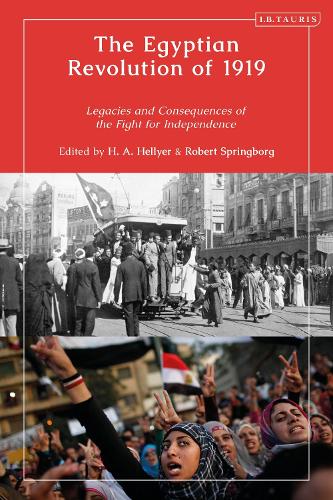
The Egyptian Revolution of 1919: Legacies and Consequences of the Fight for Independence
(Paperback)
Available Formats
Publishing Details
The Egyptian Revolution of 1919: Legacies and Consequences of the Fight for Independence
By (Author) Dr H.A. Hellyer
Edited by Robert Springborg
Bloomsbury Publishing PLC
I.B. Tauris
21st March 2024
United Kingdom
Classifications
Tertiary Education
Non Fiction
National liberation and independence
Middle Eastern history
Revolutionary groups and movements
962.04
Physical Properties
Paperback
228
Width 152mm, Height 234mm, Spine 14mm
360g
Description
The 1919 Egyptian revolution was the founding event for modern Egypts nation state. So far there has been no text that looks at the causes, consequences and legacies of the 1919 Egyptian Revolution. This book addresses that gap, with Egyptian and non-Egyptian scholars discussing a range of topics that link back to that crucial event in Egyptian history. Across nine chapters, the book analyzes the causes and course of the 1919 revolution; its impacts on subsequent political beliefs, practices and institutions; and its continuing legacy as a means of regime legitimation. The chapters reveal that the 1919 Egyptian Revolution divided the British while uniting Egyptians. However, the revolutionary moment was superseded by efforts to restore Britain's influence in league with a reassertion of monarchical authority. Those efforts enjoyed tactical, but not long-term strategic success, in part because the 1919 revolution had unleashed nationalist forces that could never again be completely contained. The book covers key issues surrounding the 1919 Egyptian Revolution such as the role played by Lord Allenby; internal schisms within the British government struggling to cope with the revolution; MuslimChristian relations; and divisions among the Egyptians.
Author Bio
Robert Springborg is Professor (retd) of National Security Affairs at the Naval Postgraduate School, USA. Formerly he was Professor of Politics and Director of the London Middle East Institute of SOAS and Director of the American Research Center in Egypt. His publications include Political Economies of the Middle East and North Africa (2020), Mubaraks Egypt (1989) amongst others, and he has worked as a consultant on Middle East governance and politics for USAID, the U.S. State Department, the UNDP, and various UK Government departments. H.A. Hellyer is Senior Associate Fellow at the Royal United Services Institute (RUSI), UK, and a scholar at the Carnegie Endowment for International Peace in Washington DC, USA. He is also Senior Scholar of the Azzawia Institute in South Africa, Professorial Fellow at Cambridge Muslim College, UK, and adjunct full Professor at the University of Technology's Centre for Advanced Studies on Islam, Science and Civilisation in Malaysia. He has worked for the UK Government and Foreign & Commonwealth Office and his analysis has been published by CNN, the BBC, the Washington Post, the New York Times, Mada Masr and the Guardian.
